#While it is true that fanbases are not directly controlled by the creators of a work
Explore tagged Tumblr posts
Text
I think it's important to remember as a writer to understand your audience, but not in the corporate marketing way. Much more in the sense of when to jokingly reference anything in the fandom(almost never, you can easily end up siding in fanon wars whether you meant to or not, and that lack of boundaries can grow toxicity rapidly), and when to shut down anything in your work that's gaining traction with any group who means harm to others(as fast as you can identify it happening).
#While it is true that fanbases are not directly controlled by the creators of a work#I do think there is a point where people build the audience they deserve#Even playful jokes about certain parts of your audience can come across mean-spirited#And it can cause self-selection away from people enjoying themselves and towards bullies#And if you see serious prejudice taking root around your work you should speak on it imo#Also if you willfully try to harness fandom to be your personal validation machine THAT will backfire MASSIVELY
6 notes
·
View notes
Note
hi! i'm currently reading a novel (that was actually recc'd by finn wolfhard lol) and part of the story involves the publishing of a novel. there's lots of mise-en-abyme style plot points about how the publishing industry works, image management, pr, pop stars, music biz, etc etc. and in it, the narrator (a writer) bickers with his agent about what sells, and the agent says, of the target market of a pop star on his books, 'she's already got the tweens, it would be great if she could get the gays, too. BOOM!' and he mimes a cash explosion.
the book is not cynical nor celebrating such capitalism, just a complex and realistic portrait of how people in the world operate. and reading it made me think of the prevalent 'if byler doesn't happen it'll be queerbaiting' argument i see a lot in fandom, which is something that, while true, simply appears to me as the unhappy voice of the powerless; hopeful viewers. its an argument that assumes that people who work in production care about something like that, about the ethics and morals of it, when actually, often, they're actively using those techniques as part of their business acumen.
of course we hope for better from our artists - the writers, the duffers - but i think people here say 'that would be homophobic' or 'that's queerbaiting' as if doing those things is illegal, against the rules, or unjustified within an industry like showbusiness, when actually, while it's morally wrong, it certainly happens and also wouldn't necessarily mean that the creators would lose their jobs or careers or anything like that.
I'm not sure what you're trying to get at here. Of course, there are no laws or ethical codes against queerbaiting. I don't think anyone has claimed that as a reason to have faith here. However, in most cases, it is not a desirable accusation for a creator to have to contend with. It wouldn't directly impact anyone's job, but there could still be a negative impact depending on the severity of the fanbase's reaction. Queerbaiting doesn't impact the financial output of a product, but it sullies its legacy, which, in turn, follows the creators through their careers. It's not a killer in situations where the creators are mostly behind the scenes folks who don't get publicity, but the Duffers are prominently out in front of this show. They are a brand unto themselves now, and that brand needs to have market appeal. They do seem to have painted themselves into something of a corner regarding Byler, but it's largely because they gave the audience far more credit than it deserved. However, I think the fear that the general audience would revolt against Byler is far overblown. The Duffers have nonetheless written the show they wanted to write.
There is no reason to expect the Duffers to knowingly queerbait anyone. Netflix? Perhaps. It only cares about numbers. However, the Duffers went with Netflix in the first place because they were given full control to create the show they wanted to create. They passed on the major TV networks because the execs pressured them to change the show. They were also furious when Netflix merchandising spoiled a good amount of season 4, and they brought that up with Netflix. They aren't afraid of Netflix. And we're way past the point of the Duffers stumbling into this storyline by accident, so we can write that option off, too.
Honestly, this whole situation, and whether someone has faith that it won't be queerbait, simply comes down to trust. I trust the Duffers because they haven't given me any reason not to. They've so far championed the outcasts, and I see no reason why they'd slam the door on a gay teen who spent the entire duration of the series suffering, mostly in silence, at that. I trust them to do right by Will.
If they make me regret that, then it will likely cause me to never watch anything they make again. Until then, however, I will trust them to follow the story they've created to completion. And I think that Netflix probably needs them more than they need Netflix, anyway. After the success of Stranger Things, the Duffers could probably write their own ticket with any distributor they wanted.
tl;dr: Yes, business is business, and companies will gladly do whatever to get money, but the Duffers have shown themselves to be social champions. My only worries lie with Netflix, not the Duffers. However, I think Netflix needs the Duffers more than the Duffers need Netflix, so I'm not worried about executive meddling in this particular case.
16 notes
·
View notes
Text
Memes Kill Creativity?
Memes vs. Genes
In the 1976 book The Selfish Gene, Richard Dawkins coined the term 'meme' to describe something with symbolic meaning that spreads by imitation from person to person within a culture. This idea is an analogue to the nature of selfish gene, described similarly as a piece of genetic material possessing information required to be able to replicate themselves inside a living. The only key difference in both terms is that the gene is natural, while memes are artificial. The rest of memes' operating schemes completely mimic the genes perfectly. In our current timeline, memes as we know today are taking many forms: as image macros, short videos, and rick-rollicking music. Memes in imageboards and forums have been pushing internet porn traffic into a stalemate and putting our power grid into unnecessary burden. Of course, memes are not to be regretted, but otherwise need to be taken seriously, since they are able to put our current understanding of media industry and economic system into shame.
As with every other thing that have existed, memes are not exempt in its dualistic nature. If you ever venture to the depths of dark web, you may know that memes also took part in the infamous mimetic Tumblr-4chan War. Not only that, some memes are reportedly causing harm towards some users, even though it is often disguised or said to be a dank joke or mere sarcasm. Memes have seen its share of use in online bullying, mass shootings, and hate crimes, cowering behind the freedom of expression tag. Regardless, memes are also an extremely effective form of information transmission. Like all living systems with no set moral standards, memes do evolve and are subject to natural selection. Memes, like genes, actually work like a mindless machine. Again, this is eerily like the performance of DNA in living systems. The last thing we want from this thing is virulence.
Every day, something went viral on Twitter. Hashtags are flaring into the top trends, some videos are being watched billions of times, and another cat vs. cucumber pic garnered thousands of likes. Viral properties of a virus (duh) is defined as the capability to multiply quickly in relatively short amount of time. The term saw a huge increase in usage during the dawn of the internet age and the rise of computer malwares spread through unsecured ports of network protocol. This term is being applied to memes, as it is like a virus (which is a pure embodiment of a selfish gene). Now, a lot of people are utilizing memes to create art, because it enables them to cater the short-attention spans of current internet users. They create shorts, illustrations, inside jokes, and small comic strips. Some of you might not agree with me on this one, but stay with me now and I will explain to you why I would like to treat memes and art as a single unit of interest in this argument.
The dawn of meme-technology
Viral memes and their popularity are now often considered important in defining a time period in the internet culture. Now every netizen can somewhat distinguish the approximate age, sex, and political views of other users from the usage of rage comics, meme songs, and meme platforms they use. Intuitively we can make a generalized difference between the userbase of Reddit, 4chan, 9gag, Vine, and now Tiktok. Others, by the share of relatability with sub-genres of different areas of interest (film memes and game memes). Some others, even, in the perspectives of different social and economic class system (first world problems and third world success memes). Meme preferences to us netizens are ironically giving away our anonymous identity. Identity which the media companies are vying to get their hands on. That's where I would like to come into my opening argument: both memes and genes which originally possesses no intrinsic value, suddenly become a subject of value with technology.
How do we draw the logic, I say? The ones and zeros inside electrical systems are value-free, so does DNA in living cells. As we meddle ourselves with biotechnology to manipulate genetic material for profit, we also simmer ourselves in the computer sciences and tweak physical computation to perform better. We give value in the inanimate object by manipulating them. In our world, we often heard these expressions: that communication is key, sometimes silence is golden, and those who control the information wields the power. What’s these three statements have in common? Yes, information and expression. Memes are the simplest form of both. This is the beginning of the logic: memes are no longer in and on itself independent of external values. The infusion of utilitarian properties in memes as artificial constructs are seemingly inevitable, and for the better or worse shapes our current society.
We might have heard that somewhere somehow, the so called ‘global elites’ with their power and wealth are constantly controlling biotech research and information technology—or, in the contrary, they control these knowledge and resources to keep shovelling money and consolidate their power. Memes are one of their tools to ‘steer’ the world according to their 'progressive agenda', seemingly driving the world ‘forward’ towards innovation and openness. Nah, I am just joking. But, stay with me now. It is actually not them (the so-called global elites) who you should be worried about. It is us—you and I, ourselves—and our own way of unwittingly enjoying memes that are both toxic and fuelling the age-old capitalism. Funny, isn't it? We blame society, but we are society. But how are be becoming the culprits yet also be the prey at the same time?
Middle-class artists are hurt
Now, aggressive marketing tactics using memes are soaring. Media companies are no doubt cashing in the internet and viral memes to their own benefit. Streaming and cataloguing are putting up a good fight compared to their retail, classic ways of content delivery. This is quite true with the strategies of Spotify and YouTube, other media companies alike. They can secure rights to provide high-quality content from big time artists and filmmakers and target these works directly to the end consumer, effectively cutting the cost of distribution which usually goes to the several layers of distribution line like vinyl products, radio contracts, and Blu-ray DVDs. I believe this is good, since it is like an affirmative action for amateur artists to start a career in the art industry. Or is it? Does it really encourage small-time artists to begin? Yes. How about the middle-class artists? Not necessarily.
You might sometimes wonder, “how the hell did I get somewhere just by following the trending or hot section in the feed?”. This toxicity of memes often brings some bad things to our tables. Social media algorithms handle contents (like viral memes) by putting those with high views or likes to the front page, effectively ‘promoting’ the already popular post and creating a positive feedback cycle. By doing so, they could capitalize on ad profits on just few ‘quality’ contents over huge amounts of audience in a very short amount of time. The problem is most of the time, these ‘quality’ contents have no quality at all. They just happen to possess the correct formula to be viral, with the correct SEO keywords and click-bait titles with no real leverage in the art movement. This way, I often find both the talented and the lucky—of which the boundaries between them are always blurred—overshadow the aspiring ‘middle-class’ artists who work hard to perfect their craft.
If you are already a famous guitarist with large fanbase, lucky you, you are almost guaranteed to top the billboards. What, you have no skills? Post a video of you playing ‘air guitar’ and… affirmative actions to the rescue. Keep on riding the hype wave and suddenly you get to top trending with minimal effort, thanks to your weird haircut. Those haters will surely make a meme out of your silly haircut, not even your non-existent guitar skills. But still, hype is still a hype, and there’s no such thing as a bad publication. This also answers why simple account who reposts other people’s content could get much more followers than the hard-working creators. Not only being outperformed by the already famous artists taking social media by storm, now the ‘middle-class’ artists are also dealing with widespread content theft and repost accounts because of the unfair, bot grading system. It is unimaginable how many nobodies got the spotlight they don’t deserve just because they look or act stupid and the whole internet cheers around them. Remember, this is not always about the artist, but also the quality of the art itself. I believe a good art should be meaningful to the beholder.
Why capitalism kills creativity
The problem in current art industry is that we are feeling exhausted with the same, generic, and recycled stuff. We indeed already see there’s less discourse about art now. Sure, the problem lies not in the artist or medium, but is in the viewers—the consumer of the art form—and how the capitalist system reacts to it. The hyper efficient capitalist system doesn’t want to waste any more time and money trying to figure out what’s new or what’s next for you. What we love to see, what is familiar to us, the market delivers them. The rise of viral memes phenomenon in the social media pushes the market system to the point where they demand artists to create the same, redundant, easy art form. Listen to some of The Chainsmokers’ work and we'll see what music have become: the identical 4-chord progression, the same drop, the predictable riser, and the absence of meaningful lyrics. We sat down and watch over the same superhero movies trying hard to be the next Marvel blockbuster. The production companies are also happy not to pay writers extra to come up with new ideas and instead settle with borrowed old scripts from decades old TV drama. Disney's The Lion King and its heavy use of the earlier Japanese Kimba The White Lion storyline is one guilty example.
Despite it initially being an economic system and not a political ideology, it is untrue that many Marxist philosophers usher the suppression of art. While it is ironic that Stalinist policy intends to curb ‘counter-revolutionaries’—in this case his enemies—by limiting freedom of press and media; American propaganda added further so that it seems that the ideology is also limiting art and kill creativity. We all know the Red Scare in the U.S. during the Cold War saw a popular narrative of communism and socialism that is devoid of freedom of expression. This state propaganda then further become ‘dehumanization’ and make freedom of expression invalid under the guise of equality. Marx argue that total equality is not possible, and the uniqueness is being celebrated by having them doing what they do best and provide the best for their community. Thus, an individual's interests should be indistinguishable from the society's interest. Freedom is granted when the whole society is likely to benefit from an action. According to Mao in his Little Red Book, freedom of expression in art and literature, after all, is what initially drive the class consciousness. It is capitalism, not communism, that kills creativity.
If left unchecked, the threat of this feedback loop is going to cause a lack of diversity, resulting in stale content, less art critique, and overall decline in our artistic senses. Artists’ creativity that are supposedly protected by the free internet are destroyed within itself through the sheer overuse of viral memes. Capitalism has successfully turned the supposedly open, free-for-all, value-free platform that is the internet against the people into a media in which they are undeniably shaping new values on its own: the art culture that's not geared towards aesthetics and appreciation, but towards more views and personalized clicks. How social media and media industry caters to the demands of the consumer are, in Marx's own words, “digging its own grave”.
Spare nothing, not even the nostalgia
Well, people romanticize the oldies. The good old days, when everything is seen as better and easier. Look at the new art installations that uses the aesthetics of naughty 90s graphic design to become new, the posters released in this decade but with an art deco of the egregious 80s pop artist Andy Warhol, or the special agent-spy movies set frozen in the Nifty Fifties. Nostalgia offers us a way to escape from the hectic choices of our contemporary: different genres of music, dozens of movies to watch, and different fashion to consider. We choose to settle with our old habits, that we know just works. Remember how do we throw our money on sequels and reboots and remakes of old movies we used to watch during our younger days? We don’t even care about new releases at the cinema! Did you remember how Transformers 2 and their subsequent sequels perform at the box office at their opening week?
The huge sales of figurines and toys of Star Wars franchise—if we could scrutinize them enough—came from the old loyal fanbase of the late Lucasfilm series, not primarily from new viewers. Then suddenly, surprise-surprise. Our love for an old franchise deemed dead enough to be remembered and treasure soon must be destroyed to pave way for three new outrageous sequels (the ones with Kylo Ren and Snoke) by the grace of our beloved capitalism. Sadly, nothing is left untouched by the capitalism’s unforgiving corruption. Nostalgia has become a gimmick that makes people like some art more than they should, because it’s familiar. It is another way of squeezing your pocket dry.
Not that it is bad to make derivatives like covers or remixes, but the trade-offs are far too high. Consequentially, the number of original arts is now very little, because artists don’t bother making new stuff if they just aim for a quick buck. Most of the young adult novels are essentially the same lazy story progression with only different time setting and different character names. Most of them even have the same ending! No more a beautiful journey like the thrillers of Dan Brown or the epic adventures of Tolkien’s Lord of The Rings, which defines their respective times. Do we seriously want to consider Twilight and 50 Shades of Grey as a unique work? Isn’t the Hunger Games and the Maze Runner essentially the same?
If you play video games, you must have known that the trend always starts over. Game developers are making gazillions of sequels, and only a few of them that are actually good. Most are outright trash. Oh, wait, old video games like Homeworld are also getting remasters to cater the demand of nostalgic consumers. No new Command and Conquer release from EA Games? Re-release the 25 years old Red Alert because people will re-buy it! Profit!
15 June 2020 8.03 PM
4 notes
·
View notes
Text
Copyright, Creatives, and Why the Criminalization of Fan Culture Needs to Change
So. I had a couple of people on Facebook and Discord ask me about the final paper I wrote on copyright and the criminalization of fandom. Well, I got an A! And permission to share it with whoever’s interested in reading 2700 words on the love-hate relationship we creatives and fanworkers have with copyright
-
With the advent of the internet and social media, fan culture—a form of participatory culture where fans not only consume but also create content often based on existing creative works[1]—has grown phenomenally in the last two decades. For example, attendance to the San Diego Comic-Con, proclaimed by Forbes as the largest fan convention in the world, has almost tripled between 2000 and 2019. In such conventions, fans get to interact with their favorite content creators, from the people behind their favorite series to their fellow fans who create content online that they consume. In the 2019 San Diego Comic-Con alone, attendees spent around $88 million directly on events and merchandise in the convention, not counting what they spent on other costs, like transportation and housing for the duration of the con! That is a lot of money going around publicly for what is essentially a black-market hub. And these conventions, like many other aspects of fan culture, are as much hubs of illegal activity as they are incubators of creativity. This needs to change.
In the context of this essay, I will be using the term fan culture to describe the lived experience of fans both casual and serious. This is to differentiate it from the term fandom—which I will be using to refers to, collectively, all the ideas, interactions, characters, fans, and derivative/transformative works associated with a particular creative work. Fandom will be used in this discussion to describe the virtual place within which fans interact, create content derivative of, and negotiate the meanings surrounding the originating work.
I choose to discuss fandom in the context of place rather than community because places, as defined by Pelletier-Gagnon and Diniz, are “site[s] of meaning where agents create, efface, and accumulate symbols”, which are delineated by contours rather than characteristics and can exist within images, sounds, and videos as well as locations.[2] As far as fandom is concerned, a fandom will continue to exist though fans may enter and leave at will. Fandoms are countoured with recognizable characters and settings, and the fans within them create new meanings and interpretations of the originating work—while keeping within said contours—through posts, discussions, and derivative creative works like fan art and fan fiction. Often times, fandoms aren’t occupied by any single community, they’re occupied by several who each compete over interpretations of characters and character interactions. Sometimes, such communities can even develop around derivative works—enough so that the derivative work becomes the anchor and contour of another fandom![3]
As rich and diverse fan culture within fandoms can be, however, that does not detract that many activities prominent within fan culture go against copyright law. As it exists right now, much of copyright law is obsessed with copies.[4] It (ideally) grants creatives a set of exclusive rights to their original creations as incentives to produce more work, giving copyright owners (not always creatives!) the right to control the reproduction and distribution of copies of their work as well as the right to prepare derivative works based on said copyright work.[5] You can imagine, then, how easily creatives within fandoms can cross over the line to copyright non-compliance: they do it every single time they create fan works celebrating their love for the original work.
Fortunately, most fan works online fall under the fair use doctrine, which allows the reproduction of works for “purposes such as criticism, comment, news reporting, teaching (including multiple copies for classroom use), scholarship, or research.”[6] There are four criteria works are evaluated by to qualify as fair use: the purpose of the work (commercial or non-profit?), the nature of the copyrighted work, the amount of the copyrighted work used, and the effect the such use of the work would have on the market for or the value of the work.[7] Generally speaking, fan works like fan art, fan comics, fan fiction, gif sets, animatics, and AMVs that are shared online for free fulfill at least the first and the fourth criteria for fair use, which are the criteria usually prioritized by copyright holders.
The problem arises when fan creators start monetizing their fan works—creating merchandise featuring copyrighted content, selling them online, selling them in cons, doing commissions—basically, doing anything that constitutes distributing their work for profit. Thousands of such merchandise are being sold on sites like Etsy and Redbubble or featured on their creators’ social media pages for sale, and they come in many different varieties—from art prints to enamel pins to dolls to clothing. The creators of said merchandise also fill the aptly named Artists’ Alleys in conventions to sell their products in person. Groups of creators sometimes band together to create and sell magazines—often referred to simply as zines—or even fan comics for their fandoms.[8] Of course, murkier cases also exist, like let’s play vloggers profiting off of posting their playthroughs of copyrighted videogames online or fan writers and artists earning money through their followings on Patreon.
Copyright owners’ responses to such activity have varied widely throughout the years, with differing degrees of success. Consensus as of the present seems to be to leave it alone unless the fan profiting from their derivative work is experiencing significant success or making significant sums of money from the monetization of such work. At that point, the fan would be asked to take the work off their online store or, if they’re a vlogger, take the offending video down from their channel. What constitutes as significant is often up to the copyright owner.
Historically, however, this was not always the case. In the 2000s, many copyright holders famously sent cease-and-desist letters to fan creators, specifically fan fiction authors, and made their dislike of fan fiction—or specific types of fan fiction—well known. Anne Rice, author of the then-popular novel series The Vampire Chronicles, was one of them, having posted a notice on her website in 2000 that effectively banned all fan fiction of her works online.[9] Following such, several individuals online reportedly received cease-and-desist orders and threats on their businesses unconnected to their activity as fan creators, and several commenters on a viral thread on tumblr claim that they left the Vampire Chronicles fandom entirely because of it.[10] [11]
On the other side of the scale, Marion Zimmer Bradley, author of the Darkover series, dove into the fandom surrounding her series headfirst. Although the controversial Contraband incident she is connected to took place long before the internet truly caught on, it bears sharing as it is often used as a cautionary tale for copyright owners and professional creatives against participating too actively within the fandom surrounding their original work. In the two decades after she published the first book in her Darkover series, Bradley had fostered an extremely close connection with her fans, commenting on fans’ derivative works, providing feedback, curating/editing their zines—often even adopting ideas proposed by fans or introduced by fans in their fan works as canon (true) to the Darkover universe. This all came to a head in 1992 when Bradley approached one of her fans offering money in exchange for being able to use elements from the fans’ published fan works in what was supposed to be Bradley’s next novel, Contraband. The fan disagreed, and the incident ended with cancellation of the novel and the discontinuation of Bradley’s active participation in the Darkover fandom.[12]
Both these examples have played a large part in how copyright holders’ current attitudes towards fan culture are playing out. Copyright holders tread the line between too much and too little exercise of their copy rights. Too much, and they may end up losing their fanbase. Too little, and they may lose profits and control of their public image to the more prolific members of their fandom. Fan culture, to copyright holders, also presents a largely mixed bag of feelings and viewpoints that varies from holder to holder. Each copyright holder tackles the issue differently. Some, like JK Rowling, welcome it. Some, like Anne McCaffrey, tolerate it with stipulations. And others, like George R. R. Martin, dislike it but will tolerate it as long as fans don’t send their fan fiction to them (art and other works usually fall under different considerations). Whatever their approach is, the general consensus among copyright holders seems to be that they tolerate (maybe even like) fan works as long as they aren’t sold commercially and, if said fan work is a piece of fan fiction, that work isn’t sent to them with the expectation of said author reading it and acknowledging it publicly.[13]
Note, however, that none of the current popular approaches to dealing with fan culture that I listed above includes the outright banning of fan activities. Copyright owners and creatives have learned from the examples of Anne Rice and her contemporaries in the 2000s that restricting fan culture—and taking advantage of or treating fans badly—is a good recipe for a shrinking fanbase and the non-success of their copyrighted work. They have also learned how an active fandom can rapidly propel a copyrighted work to success.
James Boyle, in his article Fencing off Ideas: Enclosure & the Disappearance of the Public Domain, posits that “a large leaky market may actually produce more revenue than a small, tightly-controlled market.”[14] With the phenomena of fandom as my example, I concur. Original works anchor and draw fandoms around themselves, but the creative outputs of fandom act as both gifts to the communities of their originating fandoms and free advertising for the originating work of said fandom. In fact, according to a report published last year by a collaboration between Fandom, Inc. and Ipsos, fan content plays a large role in driving discovery of new creative works. 59% of Explorers, the market segment that makes up half the fans in the United States, claim that fan content they encountered influence them to try new content.[15] At least part of the success experienced by popular creative works online—and on social media specifically—can be attributed to the robust participation of fans in creating, curating, and sharing derivative works both online and offline.
Because of this, fandom is often seen as a hub for developing creatives. There, amateur (and even professional!) creatives can hone their skills on existing characters and settings they already love. They can also build up a following and be cheered on, supported, and guided by their fellow fans and creatives in the fandom. Some of these creatives who got their start out of fandom even go on to create the “original content” they consume themselves! This usually happens in fandoms surrounding longer-running fictional series, such as DC Comics, Marvel Comics, and Star Wars.[16] And other creatives who have grown up within fan culture also go on to create their own original works and publish their own series. Cassandra Clare, author of multiple bestselling series (including the Mortal Instruments series), famously got her start writing fan fiction for the Harry Potter fandom in the 2000s.[17] Naomi Novik, award-winning author of the Temeraire series, admits to still writing fan fiction and actually co-founded the Organization of Transformative Works[18] in 2007![19]
None of this, however, changes the fact that much of fan culture operates by the grace of copyright holders—or that much of it is, in fact illegal due to copyright. This needs to change.
Lawrence Lessig, in Remix: How Creativity is Being Strangled by the Law and In Defense of Piracy, talks about the criminalization of Gen X and their culture of piracy through peer-to-peer sharing and YouTube remixes. But it isn’t just gen X anymore. It’s the criminalization of an entire culture. To participants of fan culture, copyright has become something ignored until it is useful or relevant, which damages the credibility of law. By criminalizing an entire culture—one that is still growing no less—we’re creating a culture where it becomes alright to break the law or at least consider it lightly. In the context of fan culture where breaking copyright law is often ignored, the continued criminalization of fan culture is telling fans, especially younger fans, that it is alright to break the law if you can get away with it. By doing so, we’re compromising the very value of law.
Moreover, as both Boyle and Lessig have said, copyright as it exists now is strangling creativity.[20] [21] [22] As copyright laws become increasingly stringent and skewed towards copyright owners, the sandbox other, younger creatives can play in legally continues to shrink as well. Additionally, said laws are skewed towards estates and corporate copyright owners rather than the creatives they are supposed to incentivize. Current copyright laws in the US award copyright to creatives for the duration of their lifetime plus 70 years before their works are released into the Public Domain for the creatives of the day to play with. As it stands, there are thousands of works lost to the public, which means that there are thousands of works that will not be able to inspire another generation of creatives.
I’m not saying that copyright should be abolished. Creatives should be acknowledged and compensated fairly for the time and effort they put into creating their works. I’m saying that a system must exist that reconciles the interests of copyright owners and fan creators without criminalizing one side or the other. There must be a way to bring balance back to the relationship between copyright owners and the next generation of creatives. I can think of one—bringing the duration of copyright back down to at least the lifetime of the creative (which is the longest most reasonable duration in the context of incentivizing creatives!)—and I’m sure there are more. We just need to find them.
----
[1] Grinnell College. Fandom & Participatory Culture. n.d. 6 May 2020. <https://haenfler.sites.grinnell.edu/subcultural-theory-and-theorists/fandom-and-participatory-culture/>.
[2] Pelletier-Gagnon, Jérémie and Axel Pérez Trujillo Diniz. "Colonizing Pepe: Internet Memes as Cyberplaces." Space and Culture (2018).
[3] See the Dreaming of Sunshine fandom which emerged surrounding the popular Naruto fan fic of the same name. Similarly, there’s the Nuzlocke fandom which has spawned several fan art, fan comics, fan fics, and let’s plays based around the idea of playing through one of the mainline Pokemon RPGs under a certain set of self-imposed rules. There’s also the more recent Maribat fandom, which came into being more recently (that is, sometime mid-last year) and created a space overlapping two very different parent-fandoms: (1) Miraculous Ladybug and (2) DC Comics (specifically Batman).
[4] That’s why it’s called copy-right!
[5] U.S. Constitution. Art. 17, Sec. 106.
[6] U.S. Constitution. Art. 17, Sec. 107.
[7] U.S. Constitution. Art. 17, Sec. 107.
[8] Sean Thordsen, Esq. The Law of Anime Part II: Copyright and Fandom. 15 Feb 2013. Article. 6 May 2020.
[9] Jackson, Gita. It Used to Be Perilous to Write Fan Fiction. 16 May 2018. 6 May 2020. <https://kotaku.com/it-used-to-be-perilous-to-write-fanfiction-1826083509>.
[10] fandomlife-universe. "So I'm on AO3 and I see a lot of people who put." Fandom Life. April 2016. <https://fandomlife-universe.tumblr.com/post/140771184680/so-im-on-ao3-and-i-see-a-lot-of-people-who-put-i>.
[11] So I'm on AO3 ... (the forgotten history of disclaimers). n.d. Web. 2020 6 May. <https://fanlore.org/wiki/So_I%E2%80%99m_on_AO3_...(the_forgotten_history_of_disclaimers)>.
[12] Coker, Catherine. "The Contraband Incident: The Strange Case of Marion Zimmer Bradley." Transformative Works and Cultures 6 (2011). Web. <https://doi.org/10.3983/twc.2011.0236>
[13] Authors of /r/fantasy, how do you feel about fan fiction of YOUR works? 2019. Forum. 6 May 2020. <https://www.reddit.com/r/Fantasy/comments/b3e6jh/authors_of_rfantasy_how_do_you_feel_about_fan/>.
[14] Boyle, James. "Fencing off Ideas: Enclosure & the Disappearance of the Public Domain." Daedalus 131.2 (2002): 13-25
[15] Fandom Insights Lab. "The State of Fandom." 2019. PDF. <http://fandom.com/state-of-fandom/fandom-ebook.pdf>.
[16] Petrin, Katelyn Mae. How the rise in fandom culture changed the media industry. 21 June 2017. Web. 6 May 2020. <https://qrius.com/how-the-rise-in-fandom-culture-changed-the-media-industry/>.
[17] Jackson, Gita. It Used to Be Perilous to Write Fan Fiction. 16 May 2018. 6 May 2020. <https://kotaku.com/it-used-to-be-perilous-to-write-fanfiction-1826083509>.
[18] Most famous for being behind ArchiveOfOurOwn, one of the three most popular fan fiction hubs on the internet today
[19] Tor.com. Naomi Novik Talks Fanfic-Inspired Fantasy and Ending Temeraire in Her Reddit AMA. 25 Feb 2016. Web. 6 May 2020. <https://www.tor.com/2016/02/25/naomi-novik-reddit-ama-highlights/>.
[20] Boyle, James. "Fencing off Ideas: Enclosure & the Disappearance of the Public Domain." Daedalus 131.2 (2002): 13-25.
[21] Lessig, Lawrence. "In Defense of Piracy." The Wall Street Journal 11 October 2008: 1-3.
[22] Lessig, Lawrence. "Remix: How Creativity is Being Strangled by the Law." The Social Media Reader. Ed. Michael Mandiberg. New York: NYU Press, 2012. 155-168.
#copyright#fandom#fan culture#academic paper#final paper#vivi talks#the ongoing saga of me vs finals#the saga already ended#but here have the last paper i am ever writing as an undergrad student
2 notes
·
View notes
Text
Who has control over a story? Or: presidency as a metaphor for authorship
So… I have read the meat part of the Homestuck epilogues and I have to say, I am impressed. I have to admit that I was initially wary of the experience because the first opinions I’ve read on tumblr have been controversial, to say the least. But before I talk about the epilogue itself, I have to make some things clear. I haven’t read Homestuck in my formative teenage years. I started reading it when I was 18, so I had a lot more distance to the main characters and their experiences than I would have had if I was younger. This was also an age when my English could have been considered „good“ enough to even understand what was going on since it’s not my mother tongue. Additionally, I was just starting my degree in literary studies, so the interest in narrative structure has always been on the forefront of my reading experience, so that’s what I’ll focus on in my analysis. And hoo boy does Homestuck deliver in that regard.
First of all we have to ask: in what situation are the epilogues written? Homestuck is „officially over“, the fans are more or less satisfied, the „canon“ is supposed to be finished and can now be looked at in its entirety. This is not only important for the creators of fanworks, but also for Hussie himself. In a lot of ways, when a work is canonically finished, the author has distanced themselves from the story and the writing process. So how to write epilogues, when you have given up control over the narrative? It’s at this point that Hussie decides to make the problem explicit in the work itself: he changes the medium. What has been a narrative element in Homestuck before now becomes once again necessary for understanding the story. By changing the webcomic format to an Ao3 fanfiction format he shows the reader that these are indeed „tales of dubious authenticity“.
Now, finding the tone for the continuation of a finished work can be difficult (and we have to keep in mind that Homestuck has been over for three years). When we take a look at the Harry Potter series, where lots of fans were disappointed by a seemingly overly saccharine epilogue, we see how much can go wrong in the fans’ opinion. Actually, Harry Potter is also a good example of the consequences it has for a work of art and its fanbase when the author tries to uphold their control over the narrative after the work is finished — it can be disastrous (case in point: jkrowlings borderline surreal twitter presence). The expectations readers have are repeatedly mirrored in the epilogue itself:

And all of us are definitely the „devoted fans“ who show up to any new content, even if it’s bad. But is it bad? Whether there is too much meat (brutality, tragedy) or too much candy in it, both will be unsatisfactory. This is a thing that Rose, in the process of becoming a aware of the whole canon herself, comments on:
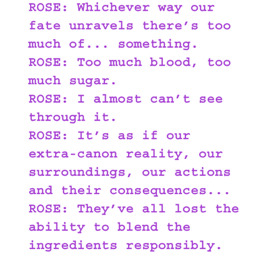
Even before the epilogues, Homestuck has always had lots of both, it varied in tone and regularly switched between tragedy and comedy, most often depicting tragedy through the lens of comedy. That was one go the things that made it unique. The way that Karkat reacts to the fact that Jade didn’t know that Obama was a real person shows how important the framing of events can be:
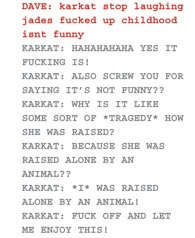
How comedy and tragedy are received respectively is very subjective to the reading experience. The reactions of the characters to canon and post-canon events mirror different fan behavior. Take for example Calliope, who seems to obsess over overly saccharine fantasies, mixed with gore and pornographic content:
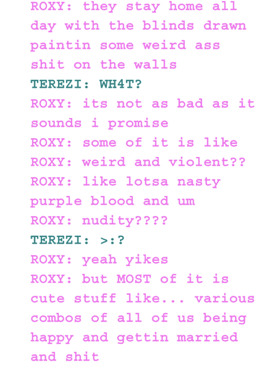
The way it is framed here, it seems to sum up the fanfiction side of the Homestuck fandom pretty well. It frankly reminded me of the times when a lot of the fandom was pretty obsessed with the dark and horny parts of Homestuck - and unapologetically so. I mean, remember the 4chan „raids“ on Tumblr? That’s what they had to say about the Homestuck tag:

Now, please keep in mind that I haven’t read the candy part yet, so if Calliopes behavior is directly referring to it, it partly goes over my head at this moment. That the different perspectives and reading experiences can clash with each other and even canonical events itself is shown in John's own discomfort at the reunion with his friends:
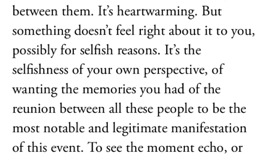
It reflects on the way that the whole of Homestuck has been perceived by the readers not only while it was running but also after it has ended. Looking at a story after it’s been finished and at the sum of all its parts leads to some problems - for the author and the creators of fan works alike. From a distance and after three years, everyone is „stuck somewhere in the harrowing nexus between canon, post-canon, non-canon, outside canon, and fanon.“ Or as Rose puts it:
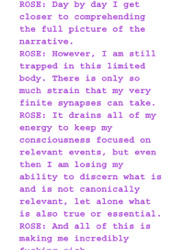
Rose realizes at this point that, much as we, the reader, the characters (especially Rose and Dirk) have also become readers of their own, their whole story. This forces them, much as us, to confront every aspect of every character that has been written in the Homestuck canon, what Dirk then calls the Ultimate Self. How do you for example characterize a person like Dirk when you know how different aspects of his personality play out in different scenarios? I mean, Bro is very much a character that exists in the Homestuck canon and — shitty as he is — shares Dirk’s genetic information. Dirk on the other hand is a person who has always tried to overcome the negative aspects of his personality that are realized in other versions of him. The convergence of personalities that happens when the characters become readers of canon themselves is in Dirk’s case as much a tragedy as it is for us, who have also seen the positive potential of his character. ultimate!Dirk then goes — in the manner of an overly sarcastic megalomaniac — from reader to narrator:
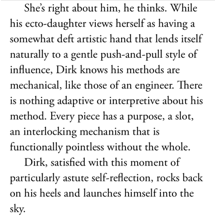
So it’s not surprising that looking at the whole of canon itself, different characters show different reading behaviors. This is as much true for Dirk as it is for every single reader, especially every creator of fan works. We take the elements that are given to us and try to create something from it. In one way or the other, by interpreting a story, everyone tries to take hold of the narrative. This is especially true for a story like Homestuck, where the interaction with fans and fan culture have been a central element of storytelling and has lead to the inclusion of multiple contributors to the work itself.
In ultimate!Dirk’s case, it is made very explicit how his particular perspective influences the narrative structure. The lines between reader and author blur even further than before:
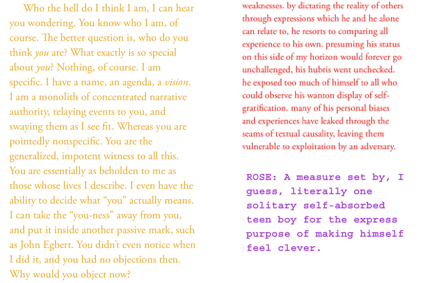
But not only ultimate!Dirk and muse!Calliope, who tries to take the narrative away from him, have conflicting views and agencies, other characters also start framing actions and people in a certain way. It’s no coincidence that Hussie decided to make an election the setting for the epilogues. In meat, Jane runs for presidency and is then rivaled by Karkat, who decides to take a stand against her „xenophobic“ views. While Karkat says:

It quickly becomes clear, that a lot of what we think about Jane in the meat epilogue is framed on the one hand by ultimate!Dirk’s manipulative narrative that influences the behavior and events, and on the other hand by Dave and Karkat’s political campaign. (Both of whom don’t leave their house very often and have probably not spoken to Jane in a long time.)

We think that Jane is xenophobic because ultimate!Dirk and Karkat tell us she is. Not to say that Jane doesn’t have some problematic views, but she seems to be far from a fascist dictator.
It mostly shows how politics is very much about presenting a certain narrative to your potential voters. And whoever controls the political narrative has a hegemonial perspective on cultural narratives as well. This is an idea that has probably been best presented in the texts of the philosopher Walter Benjamin. In his essay „On the concept of history“ he remarks on the way a ruling class presents history and historical events as a legitimization of their power, and ultimately concludes that historical methodology is also a question of politics and questioning narratives that are presented to us. In 1940, when the essay was written, it was the conflict between fascism and socialism that influenced Benjamin’s work, but today his ideas are just as relevant.
By presenting the election and conflicting narratives (ultimate!Dirk vs. muse!Calliope, Jane vs. Karkat and Dave) side by side, Hussie builds a bridge between those two. It is not only that the text is a metaphor for the current political climate, it is a metaphor for the way that current behavior in general is shaped by controlling narratives. We live in a time when fake news and callout culture are two sides of the same coin: especially in America, these two intersect more and more, in political campaigns and online. Not to say that this kind of discourse isn’t developing in Europe as well, it’s just that the American one seems to be central for the discourse and views that shape sites like tumblr. On Earth C, in the „post canon victory state“, we can see these methods of political strategy developing from the very beginning.
This becomes especially clear as Vriska comments on Hussie’s behavior (as in: Homestuck-character Hussie): „not to mention your flawless defeat of an obstructionist, hectoring, orange man, who for reasons you cannot begin to comprehend seemed to be obsessed with you.“ While the whole world sees itself confronted with the weird views of a megalomaniac orange man (Trump), so does the readership of Homestuck: Hussie and Dirk’s text are both orange and are a constant obstacle for the fans who try to take hold of the narrative, to make their perspective the right one.
Actually, ultimate!Dirk’s perspective is skewed by numerous biases, mostly concerning women and gender issues. Jade is repeatedly called „bitch“ in a derogatory way and Kanayas behavior is framed as being „hysterical“. Roxy’s transition goes straight over his head, he can’t read her intentions because he is blind to gender issues that don’t fit his limited understanding of the concept of gender. He reminds me of a member of the alt-right, shutting women out of conversations and disregarding their opinions. This quote especially:

This sounds like it’s ripped straight from an alt-righter defending his free speech while at the same time trying to shoehorn his dubious political intentions in. In contrast to that, muse!Calliopes way of telling the story seems to be fairly neutral.
So it’s no surprise that the people he tried to shut out before (women and trans people) are realizing that his narrative behavior is trying to manipulate them and they take action. Especially Terezi seems to be immune to his narrative manipulation:
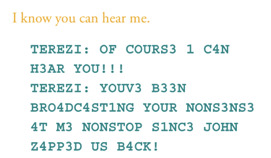
The moment that they break the hold ultimate!Dirk has over the narrative, they are beginning to feel like the old „canon“ characters.
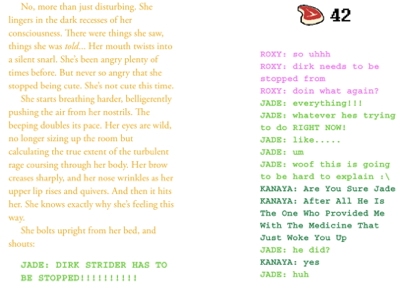
Up to this point, we had to look at genuine character moments through the lens of an unreliable narrator. Homestuck has always been a parody that got unintentionally serious, so I think we have to look at the epilogues the same way: genuine character moments under the layers of parody, commentary on fan behavior and politics.
Ultimate!Dirk ultimately fails to create a cohesive narrative, one that favors only one perspective. This is reflective of the way Homestuck has been written and perceived these last ten years. He has to fail, because the author has lost control and interpretative hegemony over Homestuck canon — no one has it.
That is why it’s so important that the voice of the epilogues is not only Hussie’s voice, but was written in part by Cephied_Variable and ctset. While Hussie was responsible for writing the dialogue, the surrounding prose is entirely in the hands of fans. It’s a decentralized narrative that refuses to acknowledge one perspective, one reception as the right one.
And much like the kids in the juju, we are now stuck in a place outside of canon, after Homestuck ended. And it just happens that everyone is starved for new content: We all wish we had brought something to read. Be it the epilogues or fanfiction, we are all stuck in a place that no longer really affects the narrative:

And look at me, how I desperately try to take hold of the narrative in this long ass meta post. This is what Homestuck means to me and this is my perspective, my narrative.
#homestuck#upd8#homestuck epilogue#homestuck meta#andrew hussie#long post#sorry this got like reeeeaaaaaally long#but if you want to read my hot takes on politics and authorship be my guest#(please be my guest)
11 notes
·
View notes
Text
asheternal replied to your post “debating if i should give my own two centso n it tbh”
who the fucc is that
ok sorta long post bc now i’m just gonna talk about my opinions with some pics so under the readmore (i’m bored)
this is about 7 months old and as we can see yeah ANet did not just collapse and is still doing healthy but the tl;dr is that Jessica Price was a dev who was fired for her conflict with a partner of ANet which spakred some debate about sexism but i honestly. really think she was just kind of an asshole and got fired for it although it did bring up some good points about the industry and the whoel thing is, no matter where you stand on it, a very messy and complicated situation
although no matter what i think firing the other guy was uncalled for as ill talk about here below
so Jessica Price was a GW2 dev that to my knowledge did work for Living World and writing for GW2 in general. she’s an industry veteran with a dozen years. she had a twitter thread about the complications of writing an MMO main protagonist, in that you have to write them in a way without too much emotion or personality or it won’t feel like “your” character, which lead to this alteration with a streamer
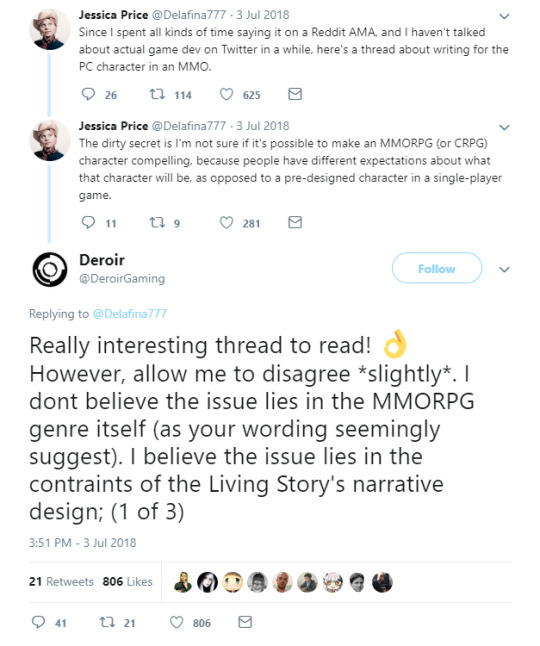
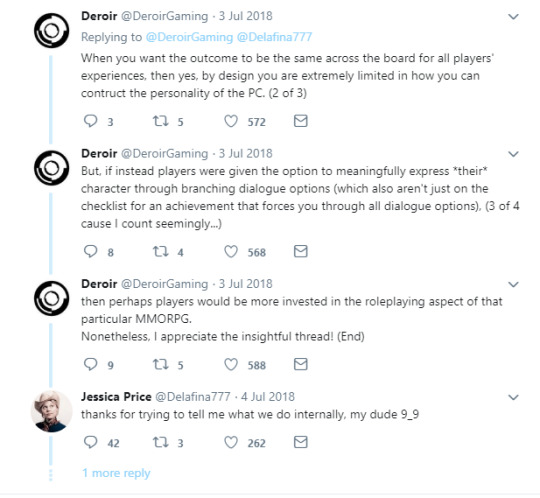
Deroir is a paid affiliate of ANet: he is a streamer, but he also is paid to i think bug test GW2 and i think has an NPC named named after him in the game: https://wiki.guildwars2.com/wiki/Deroir
maybe its mansplaining, maybe its not... it really doesn’t feel like it??? i really have the benefit of the doubt the dude was just giving his own opinion on this one as a (paid) content creator for the game with an opinion
then things really began to escalate as price made several more tweets and things got really out of control really fast
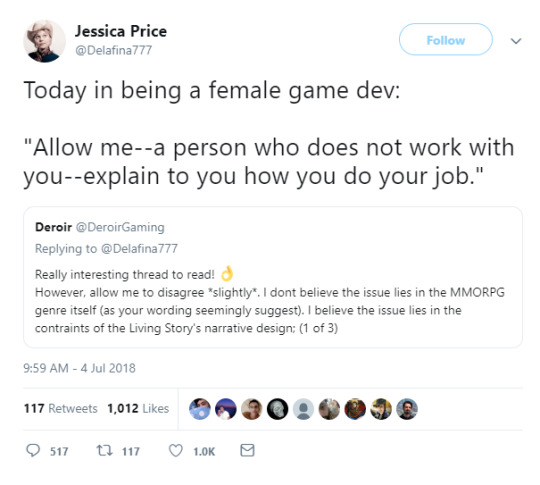
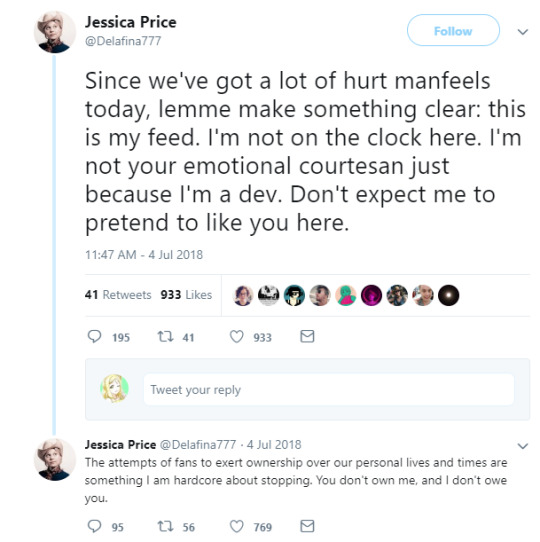
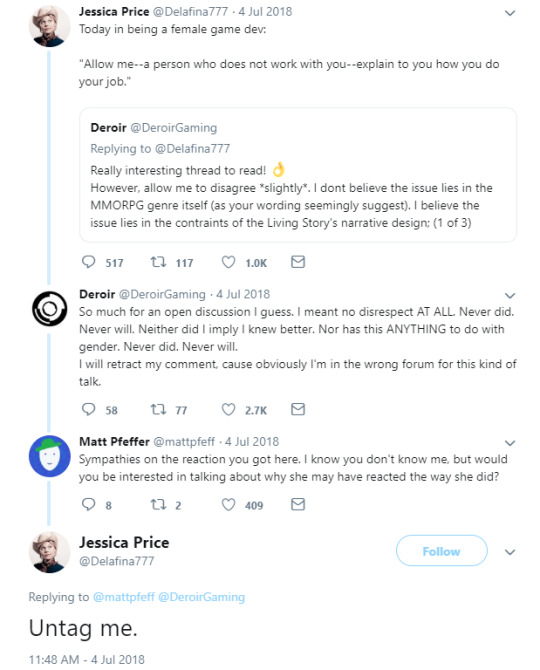
now I don’t watch Deroir’s streams so i don’t know much about the man himself, his attitude, or his personality, but this does seem to be the only conflict he ever had with her (so it wasn’t a series of little things blowing up). another dev publicly defended Price and things escalated, prompting ANet to fire them, announced by Mike O’Brien, CEO of ANet:

i don’t think it was particularly wrong of ANet to fire her at this point, as she was publicly an employed part of this company that acted extremely unprofessionally to a situation she could have completely ignored or civilly disagreed with. if Deroir had been a full-blown “sweetie, I don’t think you fully understand the writing of this game you work on :)” as far as i’m concerned this situation would be changed entirely and i’d be 100% on her side but i don’t think its hard to describe it as an appropriate reaction. the above is from the GW2 official forums on a thread concerning the incident.
i do think its worth really keeping in mind this wasn’t a conversation about gender as opposed to the writing of believable MMO characters, i really genuinely feel it was a genuine opinion that quickly devolved into something else. and everyone who knows me knows i’m usually completely on this side which is... why its. feels really weird of me to even type this because i don’t want to be against this side
i do however believe it was a bit too hasty to just fire them...? i think giving Price a chance to make up for it wouldn’t have been out of the question? it was definitely a tense situation that absolutely warranted being called into the boss’ office to say “hey. you uh. fucked up and made problems for us. you gotta fix this.” although considering Price’s attitudes i think she just would have used this against ANet later. it was a PR nightmare no matter how things would have gone down. i think Price would have blown any chance to make up for it, but I am surprised the guy was fired just for standing up for her. i would understand ANet saying “hey. you represent us publicly on twitter. do not support behavior that antagonizes our fanbase again.” but to fire him definitely seemed like jumping the gun, and that one i definitely don’t agree with. i think he (Fries) deserved a stern reprimand without consequences at most as long as it didn’t happen again, while Price should have at least been given a chance to make up for that incident
Price then reached out to basically any journalistic source that would reach out to her and decried the firing as based in sexism and harassment and basically bowing down to make gamergaters happy, and claiming that ANet’s public statement was directly harassing her by basically sicing a mob on her. it is true that the behavior she faced afterwards was unforgivable: i don’t have screenshots but you can probably imagine how it was with men like this. and Price has repeatedly blamed ANet as basically selling her out to make dudebro neckbeards happy and for not protecting her knowing what happens to a disgraced female dev in this modern day. however, to say ANet was “actively soliciting harassment” is an incredible stretch, and i don’t believe that was really the case. this was a very messy situation that ANet absolutely should have handled much better, but it still ultimately boils down to an employee acting in a way that’s unacceptable and being fired for it that... really doesn’t seem to have its roots based in sexism. she’s also gone on the record saying she’s being contacted by people who will “never work with ANet again” and milking that for what its worth. fast forward now to 7 months later and ANet clearly is still in a good place financially so... i really doubt there’s any permanent fallback as a result.
this is a video from one of the few ppl whose opinions i really like on video games so this is a good??? video to kinda help recap the events:
youtube
i just think she’s just an extremely white lady. the kind of person who demands to see the manager kind of white. i don’t have a good opinion of her nor do i think she’s “one of us” worth looking out for. i really doubt people are going to avoid working with ANet if given a valuable deal with it.
she should have been reprimanded and asked to apologize and given a chance to make up for it; although i think with the full story and conversation in mind its hard to really sympathize with her. white women are gonna white and this whole thing escalated out of control as a result and i absolutely wouldn’t want this woman on my development team for anything at the end of the day.
3 notes
·
View notes
Text
E3 2021 Needs to Find a Way to Stay Relevant in Changing Times
https://ift.tt/3fNuMe3
The ESA has revealed that E3 2021 will run from June 12 to June 15 as an “all-virtual video game showcase that will be 100 percent free for attendees.” So far, the ESA is touting “early commitments from Nintendo, Xbox, Capcom, Konami, Ubisoft, Take-Two Interactive, Warner Bros. Games, and Koch Media” with more possible presenters to come.
Considering that the fate of E3 2021 was very much in doubt after last year’s event was canceled due to the COVID-19 pandemic, and companies everywhere hosted their own digital events as the ESA failed to organize the same, this announcement may be more than E3 fans could have hoped for. E3 shouldn’t be an in-person event quite yet, but a digital version of E3 featuring heavy hitters like Nintendo, Capcom, and Microsoft certainly feels like something close to that return to normalcy that so many of us crave.
Just as there are questions about what normalcy means after the events of the last year and the circumstances which propelled them, though, E3’s organizers, fans, and presenters will have to answer some tough questions about how the event will stay relevant at a time when its greatest attribute often feels like the memory of what was.
Make no mistake that E3 was in trouble even before the 2020 event was canceled due to circumstances beyond its organizers’ control. In recent years, studios like EA, PlayStation, Activision Blizzard, and even Nintendo (to a degree) decided to abandon their traditional E3 presentations in favor of their own dedicated shows and broadcasts. The reasons for their departures vary, but as Sony’s controversial (and largely underwhelming) 2018 E3 presentation showed, the pressure and costs of constructing a yearly presentation with competition undertones sometimes aren’t worth the potential payoff from a business perspective.
The absence of those companies was certainly felt at E3 2019 which had its fans but its best-remembered moment was a Keanu Reeves cameo that has lost some luster since we’ve all played the game that was clearly not ready for the spotlight it was afforded at that show.
Many of the companies that have left E3 have used the word “change” to justify their decision. Former Sony Worldwide Studios chairman Shawn Layden said in 2019 that “the world has changed, but E3 hasn’t necessarily changed with it.” In 2020, longtime E3 partner Geoff Keighley said that “the show does need to evolve.” Both Keighley and Layden noted their desire for E3 to look beyond the booths and show floor and find new ways to connect with fans, preferably digitally.
While leaks suggest that the ESA’s own suggestions for change involve an emphasis on influencers, live gimmicks, and even potential paywalls for digital content, E3 2021 doesn’t currently seem to feature any of that. Based on what we know now, it might actually be that largely digital event that will move beyond the physical boundaries of E3s gone by that some have complained about and instead reach a global fanbase directly in their homes. E3 2021 has a chance to become the E3 that some former major presenters seemed to hope it would become years ago.
However, the biggest potential problem with E3 2021 isn’t its changes but rather the expectations of the one group of people who seem most insistent that E3 doesn’t change: its vocal supporters.
There’s no universal reason why fans love E3, but the most common reasons fans look forward to the show tend to involve key elements such as the surprise of big game reveals, the competitive nature of the show (and subsequent arguments over who “won”), and the feeling of celebrating all things gaming during a big-budget week that seems to bring everyone to the same place one way or another.
There is no beloved element of E3s of the past that has become more outdated and dangerous than the expectations of the big reveal. A quick look at reactions to E3 2021 confirmation across social media reveals that fans are already hyping themselves up for the following games:
Metal Gear Solid and Silent Hill sequels/remakes
Grand Theft Auto 6
Metroid Prime 4
Breath of the Wild 2
Starfield
The Elder Scrolls 6
Maybe some of those games will appear at the show in some capacity, but we’re once again in a situation where the absence of impossibility fuels unreasonable expectations which burrow their way into even cynical minds and become the standard. What’s worse is that the hype for these potential announcements is amplified in many cases by the belief that E3 2021 will be different from the various digital events that we saw throughout 2020 which were hyped to the moon in the days leading up to their premieres but rarely featured the kind of big announcements fans hoped they would.
The fact that there’s a semi-popular belief that E3 2021 will be substantially different from recent events in that respect already suggests that not enough people have realized the situation the video game industry faces right now. As more and more games are delayed to 2022 and beyond, the impact of the COVID-19 pandemic on production schedules everywhere should be much clearer than it seems to be. Digital showcases weren’t underwhelming because they took place outside of E3; they were often underwhelming because studios were trying to figure out how to finish games from home while creating digital presentations from the same place. The elements that impacted the impact of those showcases are as prevalent as ever.
Even if they weren’t, pre-pandemic E3s have made it increasingly clear that those mind-blowing reveals that defined E3s of the past are becoming much rarer. Leaks, quarterly expectations, and a constant news cycle mean we rarely see a game at E3 that we didn’t already know or strongly suspect was coming. When we do (such as the reveal of The Elder Scrolls 6) it’s often for a game that is so far away that it might as well not even be confirmed. Yet, we still have fans expecting to see those games even as developers do everything in their power to tell us that they’re years away. Even those who know better find themselves weighing what we do see against the games they really want to know more about.
Read more
Games
Best Games to Play in 2021
By Chris Freiberg
Games
Best PC Games to Play in 2021
By Chris Freiberg
More importantly, the fact of the matter is that the video game industry is burdened by crunch culture and skyrocketing costs that often force employees to work unreasonable schedules to complete games that more often satisfy increasingly unreasonable ROI expectations than the vision of their creators or even the desire of fans. In that dangerous environment, we’ve built this monolith to gaming that seems bright to outsiders but is being propped up by the members of an overworked and sometimes unstable industry that must constantly find ways to satisfy a yearly expectation for the big new thing.
Yet, there may be no weaker E3 tentpole than the idea of industry competition. It’s absolutely true that E3s of the past directly played into that competition element. The very first E3 was even highlighted by Sony’s surprise PlayStation release date and price announcements which essentially ended the Sega Saturn’s chances before they even got started. Subsequent years also saw companies take potshots at each other in an attempt to steal the biggest spotlight the gaming industry had.
Now, though, we’ve got Microsoft and Nintendo working together, Sony putting PlayStation Studios games on Game Pass, and PC players laughing as they get more games than ever. It’s not that competition in the industry is gone so much as it is that companies really aren’t interested in continuing to take shots at competitors that they’re more willing to work with than ever before. What we’re often left with in the wake of E3 isn’t a debate over the best showing but a petulant justification for outdated fanboyism that rarely amounts to more than which console will get the special DLC hoodie in the next Assassin’s Creed.
That leaves us with the idea that E3 will live on as this event that gets people excited about the gaming industry and brings them together, which is honestly what E3 2021 is going to have to capitalize on if it’s going to battle against times that are slowly walking towards the door as E3 tries to keep the party going with stories of that time that went to the lake in college.
You can assign E3 a fiscal value, but I can tell you what E3 is worth to you. I also can’t deny that even the worst E3 tends to be more exciting than the best digital showcase we saw in 2020. After a year of searching for hope and answers, I’m looking forward to a generally harmless event that makes millions of people feel good and feel a connection with each other.
But in the same way that Blockbuster launched Blockbuster By Mail years after Netflix showed them what the future was going to be, I can’t help but feel that this year’s digital E3 showcase reeks more of necessity than the ability to read the room and truly innovate. What can E3 do with a host of presenters that already struggled to host their own digital showcases who must now scrape together enough new games to justify a spectacle? The show’s inability to innovate in years when it was positioned to do so raises serious doubt about its ability to innovate in areas that it’s intentionally avoided for years.
cnx.cmd.push(function() { cnx({ playerId: "106e33c0-3911-473c-b599-b1426db57530", }).render("0270c398a82f44f49c23c16122516796"); });
Maybe E3 2021 will be an effective enough stopgap and get us to E3 2022 when the novelty of being able to join crowds of people at a video game event (or watch those proceedings) will suddenly feel new again. However, E3 2021’s real job may be convincing us that this event has figured out something about digital presentations that has eluded some of the industry’s heaviest hitters so far.
If E3 2021 can capture that magical something that even mediocre E3s of the past have benefited from, then maybe it can overcome all of these hurdles. At the very least, it can delay the need to justify its place in a video game industry that keeps finding new ways to tell us that it needs to move on from the burden of our sometimes nostalgic ideas of what gaming was and what we want it to be. If it can’t, then those winds of change that we’ve been feeling more and more recently may blow over the empty halls of the L.A. Convention Center come June 2022 as we all realize that the tough answers to the questions of the future are rarely found in the past.
The post E3 2021 Needs to Find a Way to Stay Relevant in Changing Times appeared first on Den of Geek.
from Den of Geek https://ift.tt/3wGCKvJ
0 notes
Text
New comics from Small Press Expo 2017
It’s been a while since I did one of these, but wanted to get back into the habit of sharing my favorite books and new discoveries at cons. As most of you know, Youth in Decline took a hiatus for a lot of 2017 to welcome our daughter into the world. SPX is a fitting “first show back” as the setting and vibe feels like a high school reunion, packed full of our favorite cartoonists, old friends, and longtime readers. Here is me doing brief, quick, hot(?) takes on most of the new books I grabbed at the show.

Sex Fantasy by Sophia Foster-Dimino. Sophia’s one of the best contemporary cartoonists working, and this chunky tome collects her multi-year series of mins into one thoughtful book. You can see Sophia working out cartooning decisions over the course of each book, with dialogue / camera / perspective experiments everywhere. The final two chapters haven’t been seen before. Just an incredible, amazing book from Koyama Press.
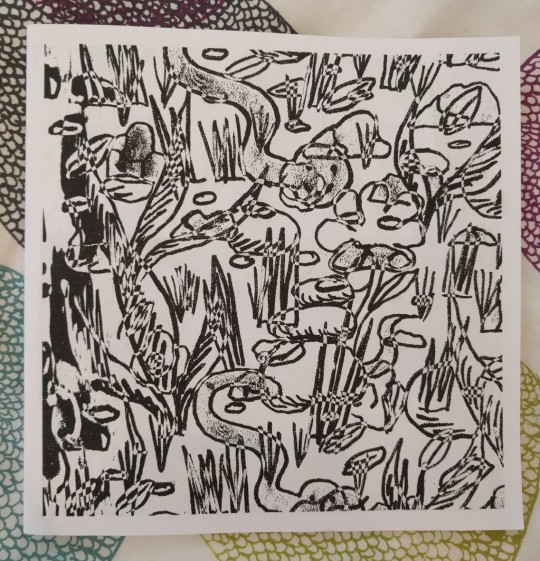


New things from my alltime favorite cartoonist (hands down), Michael DeForge. A new mini called Loose in his series of sketchbooks, and a massive, oversized new story from Koyama Press called Placeholders. It’s hard to even talk about Michael’s work, it’s so good. Michael is an incredible writer, and the drawings (where, let’s be real, he can basically draw any & everything) exist to support the writing. Special shoutout to the early YD logo sketch that made it into Placeholders as an evil startup / corporation, haha

Two fantastic minis from my SPX tablemate, the incredible Lauren Weinstein. Both of these comics, Normel Person and Perfect Maine Vacation, were nominated for Ignatz Awards and show the incredible and personal power of Lauren’s cartooning. Perfect Maine Vacation is gutwrenching (in a sweet way that kills me as a new parent) and Normel Person is a hilarious ongoing journal of life in Trump’s Amerika. Did you hear that Lauren is doing a new comic for Youth in Decline for Frontier next year? Dude, I know!!!!! (so beyond excited).
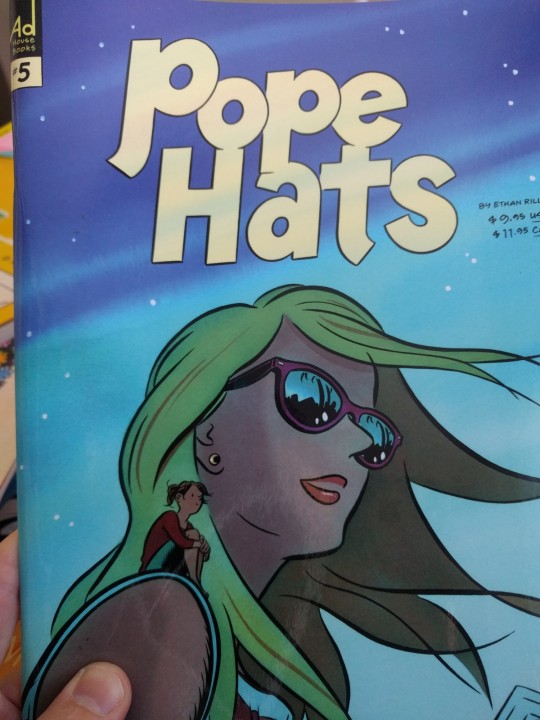
Ethan Rilly released the 5th issue of his fantastic series Pope Hats. Ethan’s sense of his own characters and the knack for small moments and relatable, too real dialogue between friends really shines here. Pope Hats is such a dense and well-appointed serial drama, I’m a huge fan.
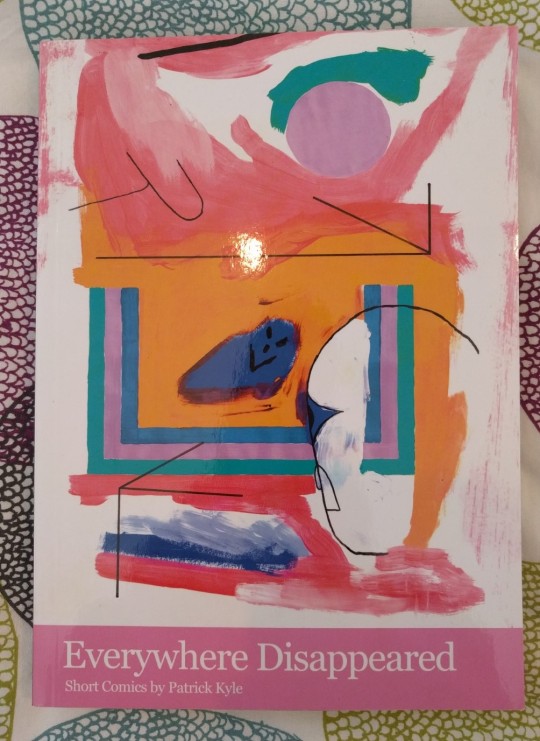
Everywhere Disappeared by Patrick Kyle. Patrick’s new collection of short stories from Koyama Press. A lot of my favorites from the last few years made it into the book. Patrick mixes familiar shapes with hyper-present narration that does this weird trick on your brain and unfolds weird contemporary paranoias and ennui. Patrick’s short comics are almost like little polemics, or allegories... upsetting but also hilarious.

I’m Not Here by GG. Another debut from Koyama Press -- Annie had an unparalleled and unprecedented SPX lineup, I’ve never really seen anything ever before at a show, the r a w p o w e r of her team. GG debuts her first long-form narrative, a quiet, slow burn of a story about identity and navigating the transition from un-responsible young adult to the burden of your own parents’ failings (health, decision-making, etc). Very restrained, withholding, and poetic.
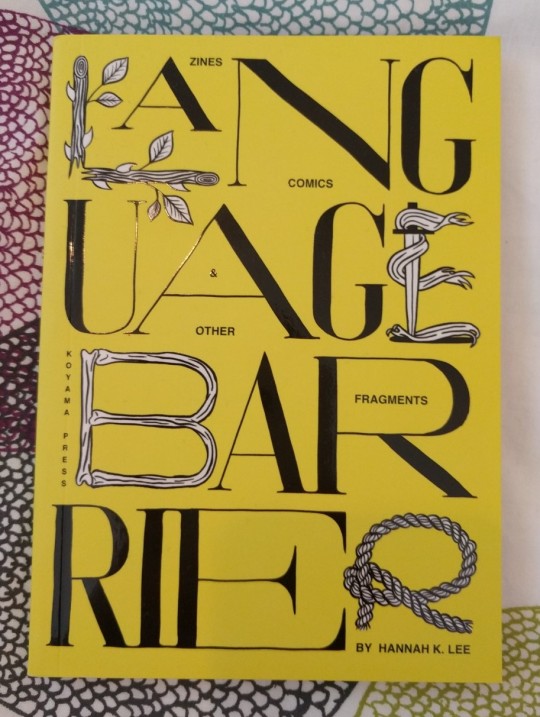
Language Barrier by Hannah K. Lee. I LOVE THE SHAPE OF THIS BOOK. Both like, literally its formal size (small!) and the flow and design of the book. Included in one tome are Hannah’s incredible type experiments, her comics, her illustrations, and her personal stories. This feels like a true monograph, showing me the many sides and numerous formats of expression from an incredible artist. I loved this book.

Baby Let’s Cruise and We’re Together Now by Jasjyot Singh Hans. I’ve been a fan of Jasjyot’s stuff for a while and following his work on Instagram -- these two minis really brought together a lot of interssting threads. Baby Let’s Cruise is the size & form of an iPhone 7 Plus, and captures the furtive feeling of messaging with someone you don’t know, and navigating the power dynamic anxiously. We’re Together Now uses an arch-metaphor to capture the earnest passion & paranoiac worry of a long distance relationship. I’m really excited about what Jasjyot is doing (and will do next).
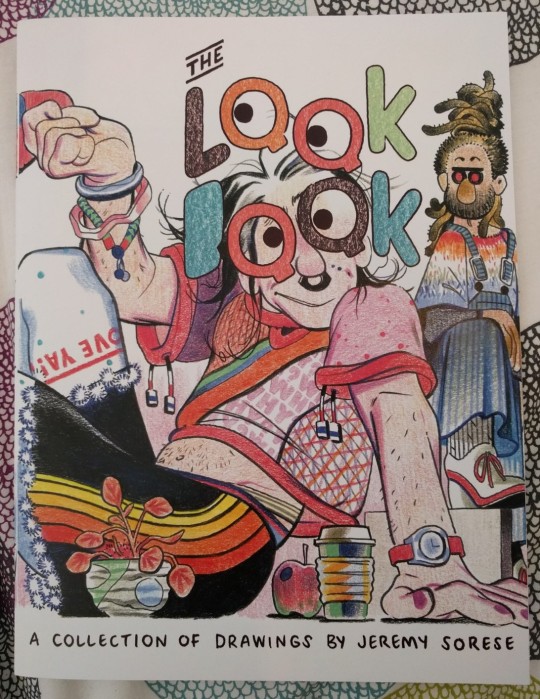
The Look Book by Jeremy Sorese. A colorful, exploding collection of imagined (and observed) fashion and bodies and cute men. Jeremy depicts people with a weighty, playful, totally wild eye. I stared at each drawing for 5 minutes, digging into all the little details. Really loving the illustration and play Jeremy is doing between his longer works, so exciting to daydream about these outfits.

Starfighter Vol. 4 by HamletMachine!~ 100% NOT s FOR w, the latest volume of my friend HM’s ongoing space sex opera is now out. I absolutely love Hamlet’s depictions of bodies, of tension between people -- she has an incredible skill for composition and the gnarly beautiful dance of bodies interacting. HM has cultivated an incredible fanbase stayed true to her vision and worldbuilding. <3

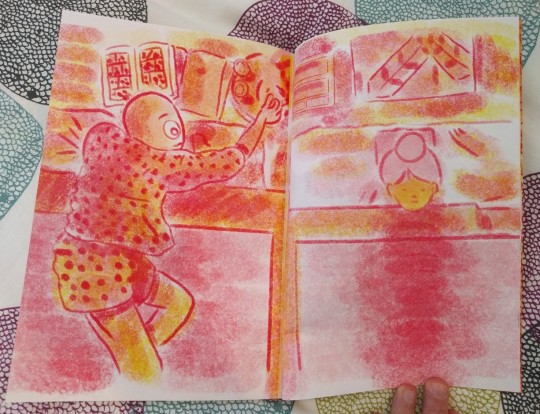
Daises by Bjorn Daniel Miner. A short collection of comics by Bjorn, created, conceived of, and produced on Risograph as part of his residency at SVA’s Risolab. Each spread is full of wild textures and color experimentation, pushing the risograph to ends I didn’t think were really possible. Melts your eyeballs, very nice!

A Modest Upbringing by Amanda Castillo. A touching short story about families (and their pain + baggage) from an exciting young talent. Printed on Youth in Decline’s risograph this past summer as part of an internship helping us out! <3

Summer Wasting and Sunset Lover by Sunmi. Two minis -- one huge, one small -- from our friend and former intern Sunmi. Summer Wasting includes a number of observational comics, sketches & poems, and a really thoughtful book design with little asides bound directly into the body of the comic. Really exciting watching her work change and mature over the past few years, and so excited about her new press, Dandelion Wine Collective. <3
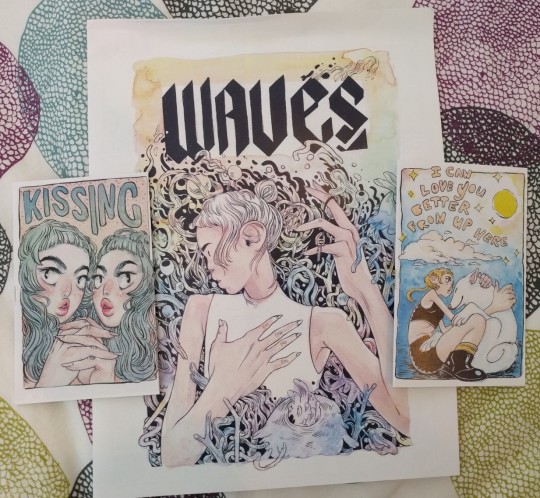
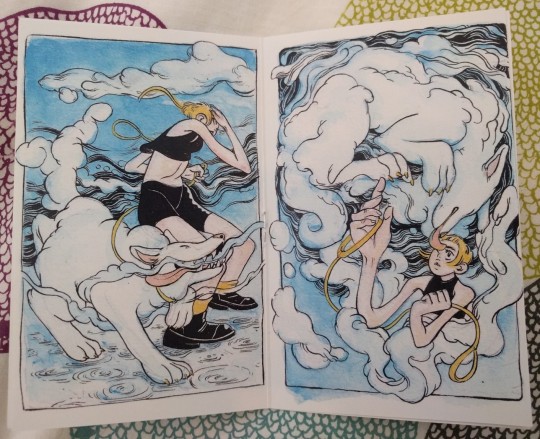
Kissing, Waves, and I Can Love You Better From Up Here by Rebecca Kirby (aka reweki). I somehow wasn’t familiar with Rebecca’s work before this SPX, but was really taken with her composition and use of color. Her panel structures and experimentation in Waves reminded me a bit of Jesse Balmer and other controlled psychedelic pieces, while the bodies in Kissing and ICLYBFUH both showed an extremely confident and fluid sense of bodies (and color). Kissing was extremely NSFW and rad, while her short musing about a lost pet made me tear up a little. Great work from a creator I’m now following closely.
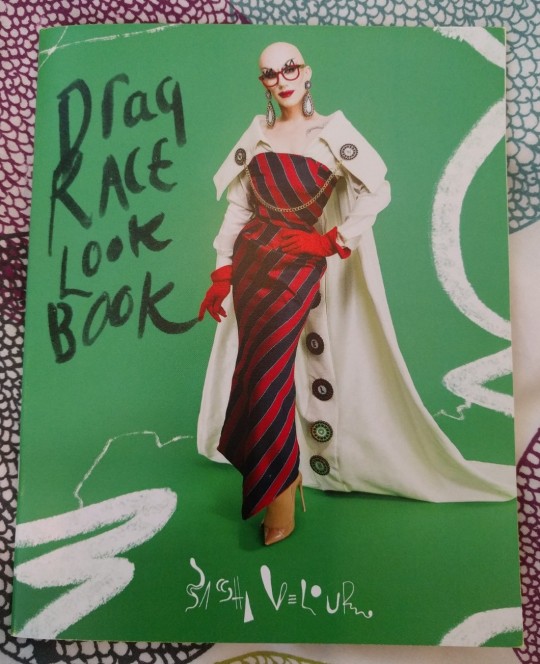
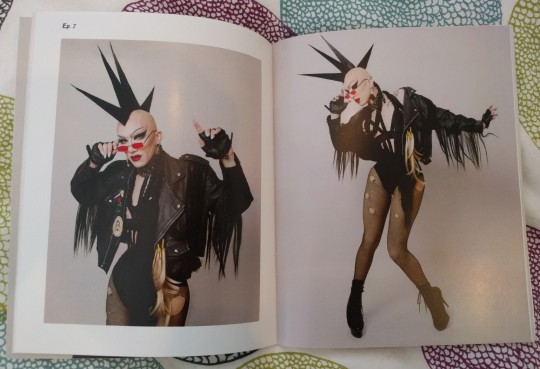
Drag Race Lookbook by Sasha Velour. Okay, so I didn’t get this at Small Press Expo but it was waiting for me when I got home. A lovely and thoughtfully designed book from the one & only... Sasha Velour! Such a great recap and reliving of her incredible looks from RPDR, and the commentary at the back is the sort of thing I live for... Who doesn’t adore Sasha? I have sweet but embarrassing memories of our second-ever proper meeting hungover at MoCCA a few years back as tablemates... such a vibrant and incredible creator!!! ah
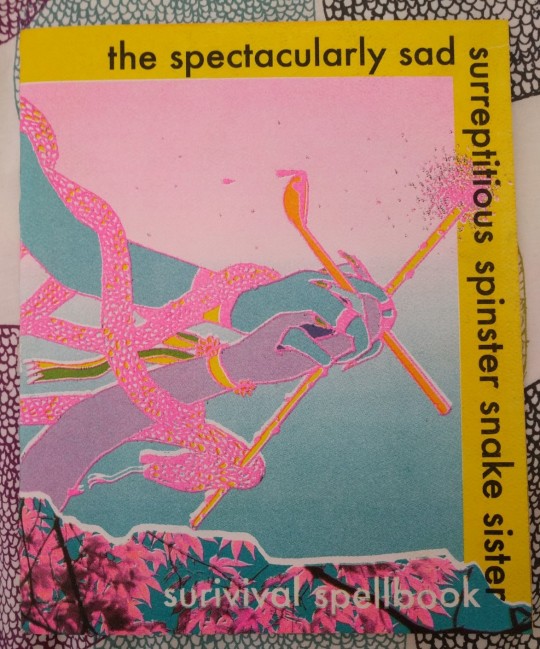
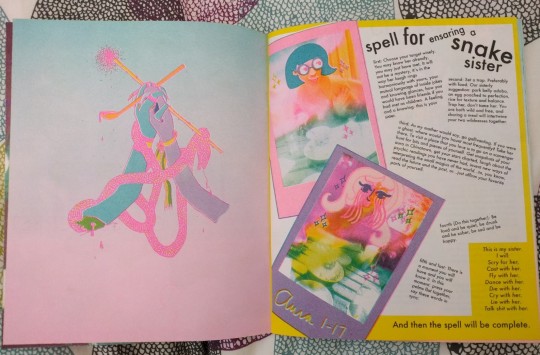
The Spectacularly Sad Surreptitious Spinster Snake Sister: Survival Spellbook by April Malig and The Untitled Queen. This was an absolutely incredible gift from April!!!! Sasha superfans will recognize this mini as featured in Velour Magazine #3. That issue smartly photographed and captured this feature as an object mini-within-a-magazine... and this is one of the rare actual copies April made just for Velour. Incredible risograph work and color composition... and it’s a little piece of comics/drag history. <3
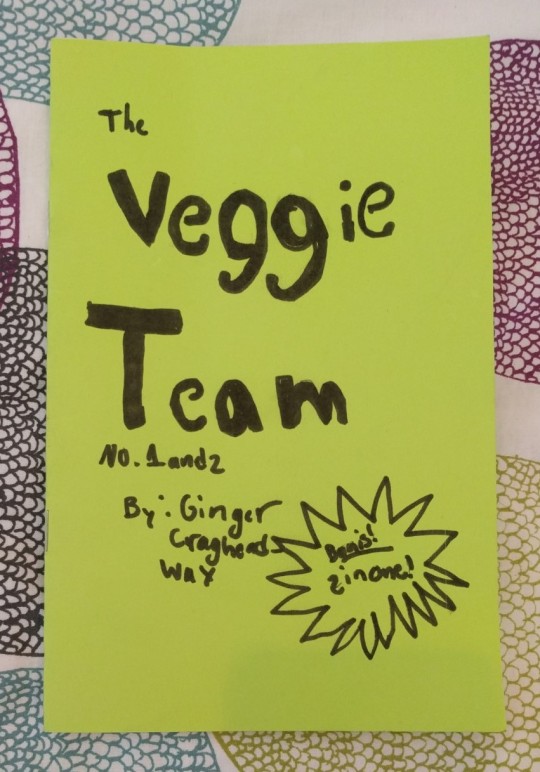

The Veggie Team by Ginger Craghead. 9-year old cartoonist creates wild mini about the pranks and misadventures of a team of wild veggies. What more can I say? This was legit hilarious (See the 2nd panel on the right page above, hahaha).
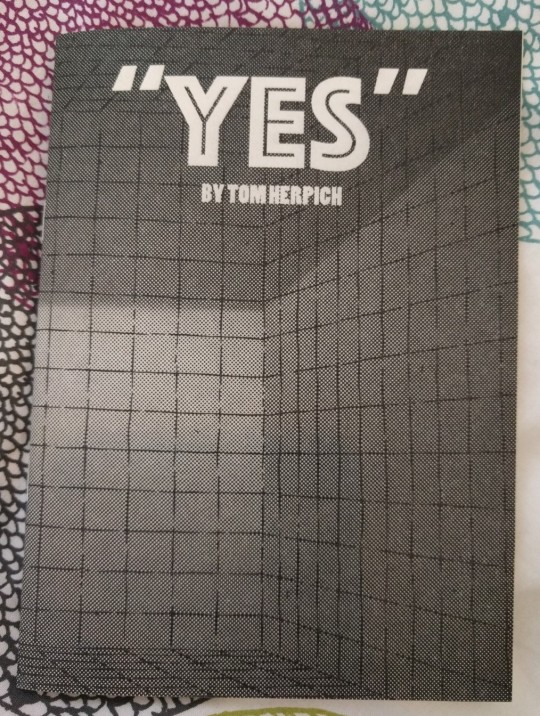
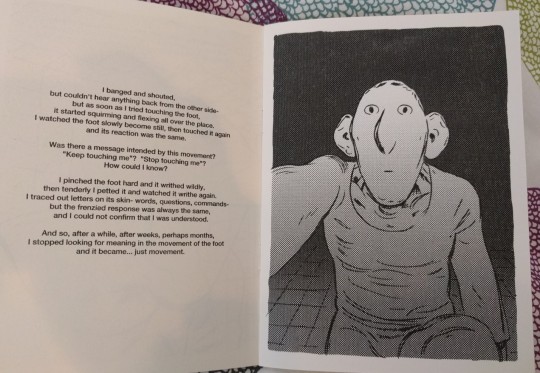
Yes by Tom Herpich. Final book from around SPX, this is a new mini from Tom... not exactly a comic, but a short story about isolation and gratification. It was startling and lowkey, and the storybook illustrations showed Tom’s incredible sense of framing and pacing. I’m such a huge fan of Tom’s work, it’s exciting as a reader to see him working through new work in his post-Adventure Time life. Available via his Tumblr still (I think?)
89 notes
·
View notes
Text
Glitched: Part 1 - Broken
Author's Note: I'm just going to put this out there - this entire fanfiction I plan to write is going to be quite dark. It's basically going to be an angsty horror story revolving around Anti torturing Jack as well as the egos. So if you're looking to have a happy fun time, this is not for you. There WILL be feels. There WILL be blood in chapters to come. You have been warned.....Enjoy!
Also, listen to this playlist while reading it
It was dark – blacker than black in the room.
And cold – very cold but not to the point of being icy.
No, this was the sort of cold that you could easily feel creeping up along your spine and chilling you to the very core – that feeling of unease you get when you feel like you’re being watched and you know something is very wrong.
And something was indeed very wrong.
The clattering of chains and heavy labored breaths of desperation and frustration echoed throughout the darkened hell. The green-haired Irishman behind a set of bars grasped at the chains linking both his wrists and ankles to the nearest wall and yanked with all the strength he could muster. No budge. Those chains weren’t coming loose no matter how hard he tried. He hissed in agony at feeling the shackles rub and dig deeper into the skin around his wrists and ankles, causing him to instantly release the chains and collapse to the ground. He lifted his shaky hands to get a good look. Those paled joints were bloodied and blistered horribly, some caked old blood from the first few attempts he’d made, while new blood was beginning to surface.
“F-Fuck.” It came out as a dry, raspy stutter, dread very evident in his voice.
He glanced up at the bars before returning his eyes to the chains. How long had it been? How long had he been here, chained up like an animal? He had lost track. And he honestly didn’t want to know the answer.
Faintly, footsteps could be heard coming towards him and with no warning, a creaky door flew open, a flash of blinding white light flooding into the room. Jack instantly pushed himself backward into the darkness, lifting a scarred hand to shield his eyes. He could barely see, but he managed to make out a dark silhouetted man stroll into the room, closing the door behind him. And as soon as that door closed, an eerie yet soft bone-chilling giggle rang throughout the room. His eyes widened. He knew that giggle anywhere.
“What’s so funny?” He demanded, sitting upright now and searching the room with his eyes, trying to spot the man.
Jack could easily hear the mirth in the figure’s voice when he spoke, taking a few slow steps towards the cage.
“Your so-called ‘loyal and loving fans’ are really something else, Jackaboy. I may have underestimated them.”
“What’re you talking about?” The Irishman snapped, not at all pleased with the demon mentioning his fanbase. “What have you done to them? What have you done?!”
A deeply amused chuckle came from the figure as he stood before the cage, peering through the bars to get a good look at his prisoner. “What makes you think I’ve done anything to them?”
“What have you done, Anti?!”
The demon only smirked and turned his gaze elsewhere. “Who said anything about me doing anything to them? I haven’t done anything.” Though he couldn’t see it, Jack could easily imagine Anti’s smile stretching further into a wicked grin. “It’s your community you should be questioning.”
There was a beat. And Jack didn’t like it, not one bit. There was something very seriously wrong with what Anti just said, especially with the way he was acting and how he had said it. However long he had been locked up here in this cage, Jack knew how Anti behaved and normally managed to jump to conclusions easily. But this time….there was something so unsettling about what he said that Jack couldn’t even begin to piece together what he meant. Managing to make out the shape of the demon’s head in the darkness, the Irishman stared at him out of both puzzlement and suspicion.
“What?” He gave himself a pause to give him a moment to think. He’s playing with you, you know that, He thought. He’s trying to use the community against you to bring you down. Don’t fall for it. He shook his head. “What do you mean by that?”
“Oh you know exactly what I mean.” Anti gave a fake gasp of shock. “Oh but wait! That’s right, you are just about as bad as them, aren’t you? Living in denial and such.” He cocked his head in his direction, his neck glitching out and causing a cringe worthy crack to emit from the gesture. “Ain’t that right, Jack?”
“What the hell are you getting at, Anti? Just get on with it!” The YouTuber shouted, slamming his cold and beat-up hands against the bars of the cage. “Stop wasting your time! If you want to kill me, why don’t you just do it already? What could POSSIBLY be holding you back, you fucking bastard?!”
There was a moment of dreadful silence, only the sound of Jack’s weak panting able to be heard. Twenty long and very painful seconds went by before the glitch gave a reply.
“I gave them a choice, Jack…I gave them a chance to redeem themselves.”
Confusion and fear swelled into a hybrid of emotion deep in Jack as he looked at his captor. He let out a shaken breath. “Wha-? What the hell are you - ?”
Very suddenly, Anti whipped around and crouched down to eye level with Jack, his face an inch away from his. Jack could easily see the sinister glee upon his face now.
“You’re not stupid, Jack. You think I don’t want to kill you? Believe me, I want to. I want to end you. Slit your sweet little throat,” He raised a hand and slowly ran his thumb along the wide-open gash on his own throat, “wide open and let you bleed out.”
Jack swallowed the lump in his throat and let out a shaken breath, watching Anti’s thumb before meeting his eyes again.
“But you know me, I like to have a little bit of fun with things like this. So I decided to go and give your fans a choice: Step back and watch good ol’ Anti slice and dice their hero or make a move and save dear Jackaboy.” The grin on his face stretched impossibly wide, giving the appearance of a frightening jack o’ lantern now.
A beat. A painful one at that. A wave of anxiety immediately came over Jack as he stared directly into those soul-devouring eyes. He shook his head.
“S-So what? What, you think they’ll side with you? They’d never do that, they’d never let you hurt me – EVER. They care about me, they’ll fight for me!”
A shrill unnerving burst of laughter came from Anti as he threw his head back, causing the green-haired Irishman to flinch and reel back from the bars. The demon’s eyes locked back onto him.
“Oh you have no idea just how wrong you are, Jackie. Do you not remember what happened in October?” He leaned forward. “I gave them a choice – the very same one. Save Jack or let him die. Now…which one do you suppose they chose, hmm?”
The anxiety the YouTuber had been feeling was ever so quickly beginning to transform into full-blown fear. His eyes slowly widened at what Anti was getting at. He was now finally seeing where this was going. He shook his head violently.
“ No…No, no, NO! You’re wrong! They care, I know they do!”
“Oh really? Is that so?” The glitchy demon challenged. “Because I gave an announcement just the other day, encouraging them all to create a bunch of fanart and you know what that’ll do, don’t you?”
Jack’s eyes were as wide as saucers now, knowing all too well what that meant. “No…”
“Oh yes. And here’s the kicker, Jackie: A lot of them have concluded it’s exactly what I need to emerge and take control fully. They know this, they know what’s coming, and yet…” He stopped himself, choking on a laugh at the notion of the thought, “yet they have gone and proceeded with exactly what I wanted.” Jumping to his feet, Anti pushed himself away from the bars and stood a few feet away from the cage. “I mean, just LOOK at what your ‘loving community’ has done for you, Jack!” With a flick of the wrist, a patch of darkness turned into a bunch of static, pulling back to reveal every single piece of fanart Jack’s fanbase had made in the past few days.
Jack couldn’t get himself to speak. Page after page was filled with fanart, a vast majority of it consisting of Anti. There were too many pieces involving Anti being the center of attention. Too many…Too many…
“So my question to you, my dear ol’ friend: Do you think they still care about you? Because I don’t know about you, but,” The mirthful creature couldn’t contain his chuckle, “if they truly did care about you, I’m pretty sure they wouldn’t have gone and done what they did.”
Snapping himself out of his dazed state, the Irishman licked his dry lips and barely managed to get out his response. “There’s still time to fix this. They’re smart, they’ll figure something out.” He sounded desperate, like he truly wanted to believe his own words…but he was struggling in doing so.
Anti threw his head back, another gross crack of his neck reverberating throughout the darkened hell. “HA! Is that what you honestly think? You really have no idea, do you, Jackie? Are you that blind?” With lightning-quick speed, the demon glitched right to outside the front of the cage, staring down at his weakened host. “They created me, Jack. They’re the ones who gave me a form, a face. They’re the ones who gave me life, not you.” That eerie toothy grin was still plastered on his bone-white face and it sent chills up Jack’s spine when a chuckle came from deep within his slit throat. “They are my creators…and being that they are my creators…no matter how much they say they love you, how they are on your side and that they hate me…they will ALWAYS come back to me, Jack. They will ALWAYS want to see me in the end.”
Jack shook his head in disbelief, trying hard to block out what this demonic abomination was hissing to him. There was no way it could be true, it couldn’t be. His fans – the community – they were there for him just as he was there for them; they would never abandon him, they would never give up hope!
“No…No…”
Anti pressed his face against the bars, getting a better look at the now-cowering heap of flesh named Jack. “They say they’re on your side, Jackaboy, but if they truly cared, they would’ve saved you long ago. All of this,” He flung his arms out, gesturing to all around the room, “wouldn’t have happened. I wouldn’t be a bother!” He stopped himself yet again, a fit of laughter racing out through his vocal cords. “But alas, here we are.”
A painful pang of betrayal and hurt stabbed the Irishman’s heart at hearing this and he keeled over, gripping his chest and shaking all over at the thought. He shut his eyes tight, trying desperately to ignore the demon’s words. Anti noticed his struggle and chuckled, once more crouching down to eye level to look at Jack quiver.
“And you want to know the best part out of all of this, Jackaboy? I’ll tell you. You see, the truth in all of this is that they want to see what I’ll do – to you, the Doc, Brody, all of you. They say they care and want me to back off, but we all know they’re lying.” He leaned in close, whispering through the bars, “They’re my creators, Jack…and no matter how much they deny it, they’re curious to know what their creation is capable of. They want to see just how powerful I can be.” Anti’s eyes flashed a bright dangerous green, his tone shifting to a much deeper inhuman one. “In a sense….they’re your executioner.”
That last sentence had the poor green-haired man cringing and reeling back out of horror, forcing himself into the darkest corner of the cage and curling himself into a ball. He couldn’t ignore the words, he couldn’t get the thought out of his head. Was he right, was everything Anti said the truth? Was it over? Had he lost the community to this demon? Did they ever truly care about him? Were they all fans of Anti’s from the very start? They created him after all – a dark, sinister alternate version of himself. What reason would they have to create such a monster other than to cut him out of the picture? It would make sense why they would side with Anti. Maybe he was right….maybe he was just a lab rat in all of this, a test subject for them to release Anti onto like a helpless rabbit falling victim to a rabid dog off its leash.
The tears started coming and there was no stopping them. He buried his face in his scarred hands and sobbed, feeling both mental and physical pain radiate all throughout his body. Over and over he repeated softly, “No….No….They…They care….I-I know they care….I know they do…” Hanging onto that last string of hope.
With a scoff and a triumphant smirk on his face, Anti stood up and turned on his heel, heading for the exit.
“Oh but don’t worry, Jack. I’ll please your fans. It’ll be like you never left.” He reached the door, grasping the handle. “They want to see just how powerful I can be….” His entire being glitched and the tone in his voice changed once more. “They won’t have to wait much longer.”
And that was the last haunting statement he made before leaving the weakened Irishman to drown in his sorrow within the darkness.
Part 2 - Save Him
@fear-is-nameless
@golden-eyed-guardians
@anti-support-group! I actually wrote a little Anti fanfic! :D
#i actually wrote a small antisepticeye fanfic#i'm actually stunned#can't believe i wrote this#enjoy!#septicart#antisepticeye#anti#jacksepticeye#antisepticeye fanfic#jacksepticeye fanfic#anti fanfic#glitched
292 notes
·
View notes
Note
Can I request a chapter where Mai sticks up for Harry, and actually does "accio, Voldemort!"?
I waited too long to respond to this, and I’m sorry. Ishould’ve replied right away, but I wasn’t sure how to word it. The answer isno, I cannot write this. The answer was no from the moment I first got yourask, and I feel bad about potentially allowing you to assume that I was goingto write this. I’ll explain why under the cut, since the explanation isn’texactly short.
As a fanfic author working with other people’s characters, Ican do whatever I want. A fanfic author has the freedom to twist and interpretthe creation of another person, and it’s an incredibly fun experience, whetheryou’re reading fanfics or writing them.
But as this ask helped me to discover, I don’t have the samefreedom with characters that I created myself. In my eyes, that would be abetrayal.
As a concept, the idea of Mai summoning Voldemort to helpHarry is hilariously funny, and it provides lots of comedic opportunities, andI know I’m to blame for being the one to joke about the idea in the firstplace, but I can’t do it.
Mai was initially nothing more than a background characterwhose existence was an inside joke between me and my friends (the same is truefor Akiko, Katsuya, Mikasa, Emi, and Hana), but she began to demand a largerrole, going from a background character to a reoccurring character to a majorcharacter to a main character and eventually settling down as the deuteragonistof the story. As such, I’ve put quite a bit of time and energy into developingher character and what themes she’s involved in.
One of the first things I mention about Mai in “ThingsFall Apart” is how much magic she has, with Nikolai – a character who, youshould bear in mind, is a person who enjoys combat – showcasing admiration forher and praising her abilities. This is, intentionally, a very biasedviewpoint. And it actually doesmatter, because Mai’s combat ability is extremely limited.
In my story, the amount of magical power that a personpossesses has a direct correlation with how much control that person has over their magic. Mai, who has more threetimes as much raw magical power than anyone on record, has almost no controlwhatsoever. To clarify – let’s think of this in terms of guns (there are gunsin this world, but they’re not relevant right now). Someone with a very smallamount of magic has one gun and is really good with it. Someone with a very large amount of magic, on the otherhand, has one gun and more ammo, but isn’t quite as good a shot. A person withthe amount of magic that Mai has is essentially armed with a rocket launcher, anear unlimited amount of ammo, and absolutely no idea how to use said rocketlauncher.
In other words, Mai can’t fight in a group because she’dprobably hurt her allies more than her friends, and she can’t use magic in upclose one-on-one fights at all because she’d end up just as injured as herenemy. If it’s her against several people, the best solution is usually to usea spell that sort of acts like the Pokémon move “surf” and just hitseverybody, unless she’s far enough away in which case she can just blast ‘em.The insane amount of magic and her lack of control makes her a ratherinconvenient ally, which is why she mastered Summoning Magic, a type of magicthat is rarely used due to how much power it uses and how much time you have todedicate to being able to summon things (this ain’t Naruto or Fairy Tail; youwanna summon something, you gotta hunt it down yourself). This greatly improvesher usefulness in combat, as one would expect, but there can be seriousrepercussions (e.g., one of your Summons decides it isn’t fond of you anymoreand attacks you, you fuck up and Summon the wrong thing, etc.).
So, what does this have to do with Harry Potter? Actually,Mai is one of the reasons I almost didn’tbring the TB gang to Hogwarts. Remember how I mentioned that the universe mystory takes place in has guns? Well, those guns are magical too, but there arevery strict regulations on them. If you have more than a certain amount ofmagic, you aren’t allowed to possess or use a gun. Some people aren’t evenallowed to touch them. A person with as much magic as Mai isn’t even allowed inthe same room as a gun. Guns play abigger part in the world than that, but that’s not important right now.
A wand, like those guns, is a magical conduit – a way ofchanneling and manipulating your magic. Most of the TB gang wouldn’t be able touse a wand, as they’ve either got too much magic or have never used anythingsimilar to a wand before and don’t want to risk it. Mai is a character whoprobably shouldn’t even be near awand, much less inside a school fullof them. In other words, the first reason I can’t fulfill your request isbecause Mai is literally incapable of actually doing that, as funny as it wouldbe.
But there’s another reason too – it goes against her personality.Mai doesn’t know Harry at all. He’s not her friend, and his problems are nother problems. Mai is loyal to her friends, but a major part of her character islegitimately not giving a shit about anyone she doesn’t see as important toher. This is where her relationship with Kotomi comes into play – they’redirect opposites in just about everything. Kotomi would go out of her way tohelp someone she doesn’t even know with something very small, whereas Mai couldsee a person she’s known for years dangling on the edge of a cliff a la Mufasaand wouldn’t bat an eye (unless that person was someone important to her,someone important to someoneimportant to her, and/or beneficial in the future. If there’s no benefits forher in your life, then long live the king).
And that’s why she would never help Harry – Mai is fullyaware of how much power Umbridge has over the school. As a Slytherin, Mai is ina very good place to manipulate things behind the scenes and keep her friendssafe. Publicly siding with Harry goes directly against that, as it would puther on Umbridge’s shit list. It doesn’t benefit her at all – she and herfriends are from another world (although the HP characters don’t know that),and Mai doesn’t see Voldemort as a threat. If he in any way implied that he wasgoing to hurt them, then she would go after him without a second thought (whichwould be bad, because of the Horcruxes), but he’s not the main threat here.Umbridge is. As much as Mai would love to see Umbridge crash and burn, she’s notgoing to take a risk that big for someone she doesn’t care about in theslightest.
And even if Voldemort didgive her a reason to go after him, it wouldn’t end well. Either he’d respawnthanks to a handy-dandy Horcrux, or she’d decide that the best way to deal withhim would be to get rid of his followers, which would basically involvemurdering a bunch of people (many of whom are the parents of her fellowSlytherins). Would she do it if she felt she needed to? Yes, in a heartbeat.But she won’t. As Nikolai mentioned, “nice” doesn’t necessarily mean“good”. Let’s say you’re a villain with a tragic backstory who isexplaining to the heroes why you did the things you did. Mai is the sort ofperson who would give you a comforting hug, tell you she forgives you, and puta knife in your gut all in one breath.
If I ever get around to making a published story with mycharacters and that story gets a fanbase, then those fans are more than welcometo write a fic like this. But as Mai’s creator, I can’t. On the bright side, Ishould probably thank you, because receiving this ask really made me thinkabout what it means to be not only a writer but also a creator, and I learned a lot about myself and my writing while Istruggled to think of a way to decline. So thank you so much for the thought,I’m so sorry that I can’t do it, and I will definitely remember this. I owe youone.
3 notes
·
View notes